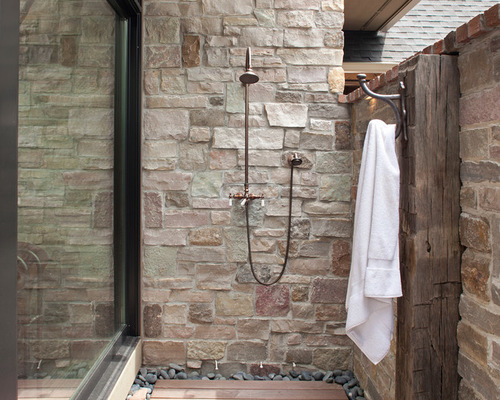Showering often feels like more of an obligation than a pleasure — especially if you exercise and have to take more than one a day. Which might explain the burgeoning popularity of outdoor showers. “You’re showering outside in the elements, and there’s something about that that intrigues people,” says Phil Regan, principal designer at Hutker Architects.
Outdoor showers have become so popular, Regan can’t remember a time he did a house without one. (Of course, that might have something to do with the fact that his office is in Martha’s Vineyard, an upscale resort island off the coast of Massachusetts.) But even if you’re not a block from the beach (or the nearest neighbor), outdoor showers can shake up your routine and make you feel closer to nature.
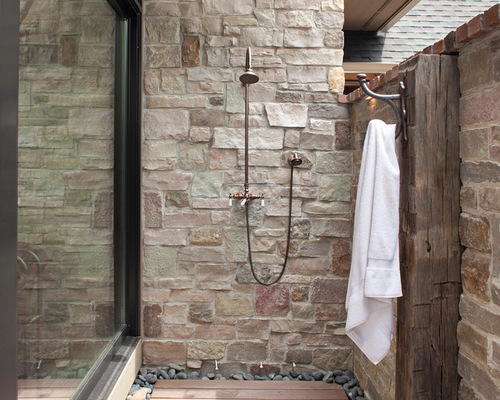
Outdoor Shower 1: John Kraemer & Sons, original photo on Houzz
Project: Add an outdoor shower.
Why: An outdoor shower makes a mundane ritual much more appealing, allowing you to savor fresh air, sky, birdsong and possibly even a view while you bathe. It’s especially handy for rinsing off before or after a dip in the pool, a trip to the beach or a grubby day of gardening. Many homeowners use them for bathing their dogs.
Related: Give Wildlife Shelter From the Summer Sun With a Birdhouse
“It’s a pretty sybaritic experience, but not everyone is going to be comfortable with that,” acknowledges architect Julie Campbell of CTA Design Builders in Seattle.
Outdoor Shower 2: brianvandenbrink.com, original photo on Houzz
Who to hire: Outdoor showers require excavation, slab work, plumbing and alterations to the existing walls of the home, so don’t just hire a plumber — go with a general contractor who has experience building outdoor showers. Without that, “you’re probably going to make a bunch of simple mistakes,” says Regan, whose firm designed the shower tower shown here.
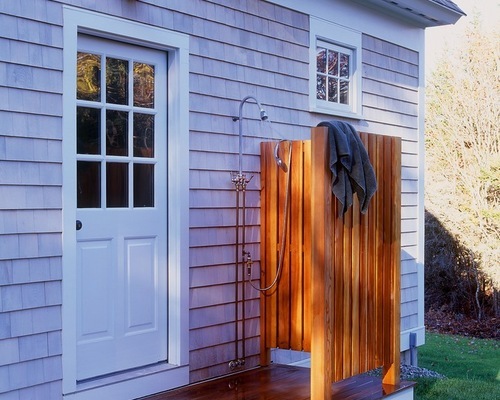
Outdoor Shower 3: John Cole Architect, original photo on Houzz
Cost range: A simple shower with hot and cold running water, like this one, can cost less than $1,000 to install. A moderate setup with a fancier enclosure can run anywhere from $1,000 to $4,000. And a more elaborate shower can cost $4,000 to $8,000 or more.
Related: Shower Stalls For a Luxe Experience
Typical project length: A simple installation can be done in two weeks; allow six to eight weeks for more complex projects.
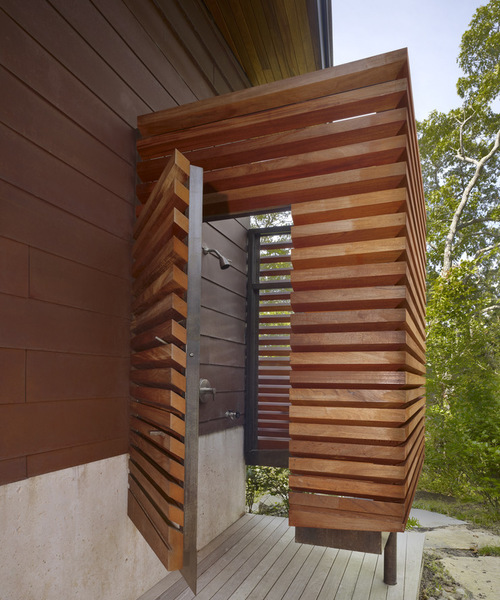
Outdoor Shower 4: Charles Rose Architects Inc, original photo on Houzz
Permit: You’ll probably need a plumbing permit. Whether you’ll need a building permit depends on the design, cost and complexity of the project and the rules in your municipality. Many jurisdictions don’t even allow outdoor showers, so do your homework first.
Best time to do this project: Anytime the ground is not frozen.
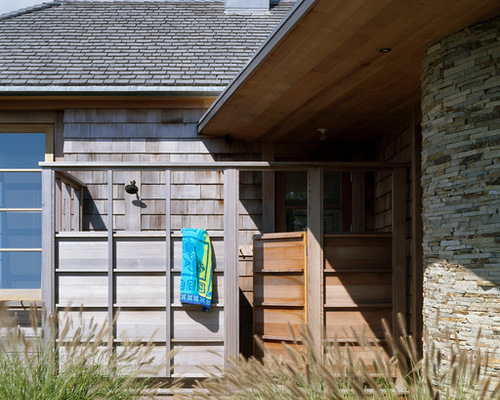
Outdoor Shower 5: Hutker Architects, original photo on Houzz
First step: The most important thing to consider when planning an outdoor shower is the location. You want it to be somewhere that gets direct sun, not only because it makes the act of showering more pleasant, but because it’ll keep the shower walls and floor drier — and that’s critical to preventing rot and scum. For that same reason, don’t place the shower under a roof overhang or tree (which could also cause debris to accumulate on the shower floor).
The other big consideration is privacy. Locate the shower away from probing eyes or add an enclosure that assures privacy (but maintains air circulation). If your house is two stories or is flanked by windows that could look down onto the shower, consider a louvered roof that prevents views in but still allows views out.
“If you want to experience the outdoors, you want to find a way to create privacy that doesn’t take away from that experience you’re looking for,” says Campbell.
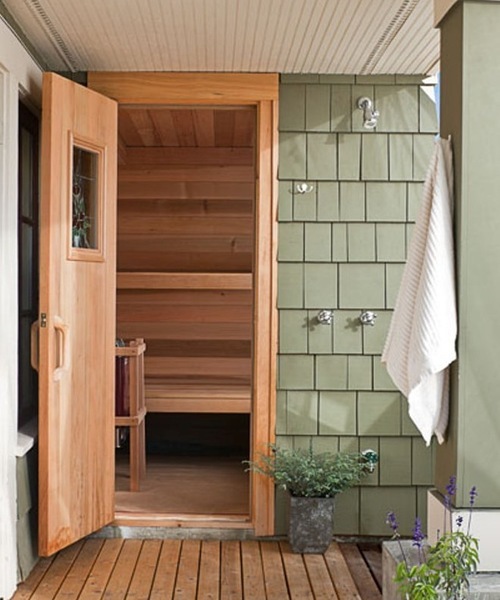
Outdoor Shower 6: CTA Design Builders Inc, original photo on Houzz
Considerations: If the shower abuts your exterior, that siding will get pelted with more water than it was designed to withstand, so go with a material like cedar, mahogany or teak and add a waterproof membrane underneath to guard against water infiltration. To avoid siding problems, locate the shower away from the house.
If you live in a climate that gets cold, be sure to locate the water shutoff valve inside the house, and have the pipes blown out at the end of the season to avoid any water freezing in the pipes.
The shower needs to drain into either the home’s graywater system or a French drain, consisting of a large pit filled with several feet of gravel that filters the water as it returns to the soil. (Expect to replace the gravel every five or six years.) Needless to say, you want to direct the drainage away from the foundation and basement, and if you plan to use soap in the shower, away from plants as well.
If possible, situate the shower to take advantage of the site’s attributes, such as views or rock outcrops. “If there are natural amenities as part of the site, that’s all the more fun you can have with it,” says Regan.
Related: Use Creeping Juniper as a Great Ground Cover Plant
By Fred Albert, Houzz
 Facebook
Facebook
 X
X
 Pinterest
Pinterest
 Copy Link
Copy Link
